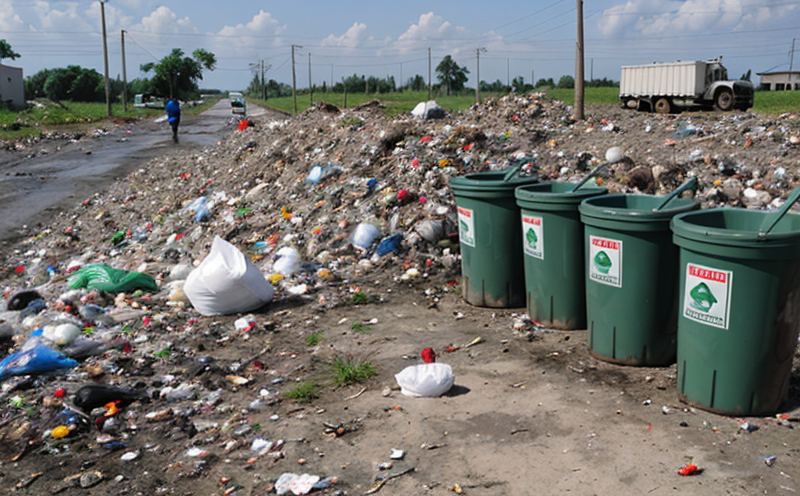ISO 22968 Determination of Organic Pollutants in Solid Waste Test
The ISO 22968 standard provides a robust framework for the determination of organic pollutants in solid waste, ensuring that environmental testing laboratories adhere to globally recognized practices. This service is crucial for industries dealing with hazardous or non-hazardous solid waste, as it helps identify and quantify organic contaminants such as pesticides, pharmaceuticals, and other synthetic chemicals.
The test process involves several critical steps: sample collection from the source, preparation of the samples to ensure accurate analysis, extraction of the pollutants using appropriate solvents, and finally, detection and quantification through advanced analytical techniques. The standard outlines detailed procedures for each phase, emphasizing precision and reproducibility.
One of the key challenges in this type of testing is ensuring that the sample preparation step does not alter the composition of the organic pollutants. This requires meticulous handling to avoid cross-contamination or degradation. Once prepared, the samples are subjected to solvent extraction methods, which must be optimized for specific types of pollutants.
The analytical instruments used in this process include gas chromatography-mass spectrometry (GC-MS) and liquid chromatography-tandem mass spectrometry (LC-MS/MS), both of which offer high sensitivity and selectivity. These techniques allow for the identification and quantification of even trace amounts of organic pollutants, ensuring accurate results.
The standard also emphasizes the importance of quality control measures throughout the testing process. This includes the use of certified reference materials (CRMs) to calibrate instruments and validate analytical methods. Regular participation in proficiency testing programs further ensures that laboratories maintain high standards of accuracy and precision.
Environmental regulations increasingly demand stringent controls over waste management, making this service essential for compliance purposes. By adhering to ISO 22968, organizations can ensure they are meeting regulatory requirements while also protecting the environment from harmful pollutants.
The process of identifying and quantifying organic pollutants is not only about detection; it also involves understanding their potential impacts on human health and ecosystems. The results of this test play a crucial role in risk assessment and management, helping stakeholders make informed decisions regarding waste disposal methods and treatment processes.
Why It Matters
The determination of organic pollutants in solid waste is critical for environmental protection and public health. Pollutants can persist in the environment for extended periods, posing risks to both human populations and ecosystems. By identifying these contaminants early on, organizations can take proactive measures to mitigate potential harm.
For industries involved in waste management or those handling hazardous materials, compliance with regulatory standards is non-negotiable. ISO 22968 ensures that testing laboratories provide reliable data, which can be used to support regulatory submissions and demonstrate environmental responsibility.
The implications of organic pollutants extend beyond immediate surroundings. Long-term exposure to these chemicals can lead to various health issues, including cancer, reproductive disorders, and neurological damage. By identifying and managing these contaminants, organizations contribute to a safer environment for all stakeholders.
Environmental testing also plays a vital role in research and development activities. Understanding the presence and concentration of organic pollutants helps researchers develop more effective treatment technologies and waste management strategies. This information is crucial for advancing sustainable practices and minimizing environmental impact.
Applied Standards
| Standard Number | Description | Purpose |
|---|---|---|
| ISO 22968-1 | Determination of organic pollutants in solid waste - Part 1: General principles and procedures | Provides general guidelines for the analysis of organic pollutants in solid waste. |
| ISO 22968-2 | Determination of organic pollutants in solid waste - Part 2: Extraction methods | Describes various extraction techniques used to isolate organic compounds from solid waste. |
| ISO 22968-3 | Determination of organic pollutants in solid waste - Part 3: Analytical methods | Presents specific analytical techniques for quantifying the identified pollutants. |
The ISO series ensures a comprehensive approach to testing, covering all aspects from sample preparation to final analysis. Each part of the standard is designed to work together, providing a robust framework that enhances the reliability and accuracy of test results.
Quality and Reliability Assurance
The quality and reliability of ISO 22968 testing are paramount in ensuring accurate identification and quantification of organic pollutants. To maintain these standards, our laboratory employs rigorous quality control measures throughout the entire process.
We use certified reference materials (CRMs) to calibrate instruments and validate analytical methods, ensuring that every test result is traceable and reproducible. Regular participation in proficiency testing programs further reinforces our commitment to high-quality data.
Our team of experienced scientists and engineers follows strict protocols for sample preparation and extraction, minimizing the risk of contamination or degradation. This attention to detail ensures that the analytical results are as accurate as possible.
In addition to methodological rigor, we invest in advanced instrumentation such as gas chromatography-mass spectrometry (GC-MS) and liquid chromatography-tandem mass spectrometry (LC-MS/MS). These tools offer high sensitivity and selectivity, enabling the detection of even trace amounts of pollutants.
The reliability of our testing services is further enhanced by strict adherence to ISO 22968 standards. This ensures that every step of the process—from sample collection to final analysis—is conducted according to internationally recognized best practices. Our commitment to quality and reliability is reflected in our consistent ability to meet stringent regulatory requirements.





